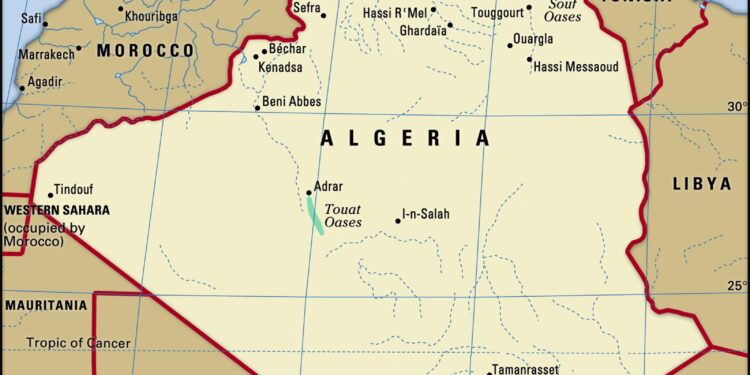Algeria has announced the withdrawal of a major port development agreement previously signed with China at Hamdania, in a strategic move aimed at easing rising tensions with France. The decision underscores Algeria’s delicate diplomatic balancing act as it seeks to navigate competing international interests while safeguarding its economic and geopolitical priorities. This development, reported by The Arab Weekly, highlights the broader regional dynamics influencing North Africa’s partnerships amid shifting global alliances.
Algeria Reconsiders Strategic Partnerships to Balance Regional Alliances
In a strategic pivot, Algeria has decided to withdraw from the Hamdania port development agreement with China, signaling a clear intent to recalibrate its diplomatic and economic priorities. This move is widely interpreted as an effort to alleviate growing tensions with France, a key regional partner, amid increasing geopolitical competition in North Africa. Algerian officials emphasize that this decision aims to foster a more balanced foreign policy, where partnerships are diversified to avoid overreliance on any single global power.
Key factors influencing Algeria’s decision include:
- Pressure from French diplomatic channels seeking to maintain influence in the Maghreb.
- Concerns over unregulated foreign investments impacting national security.
- A broader regional strategy focusing on strengthening ties with European and African partners.
| Actor | Role | Implication |
|---|---|---|
| Algeria | Project initiator | Shifts focus to balanced alliances |
| China | Original investor | Faces setback in strategic foothold |
| France | Regional influencer | Potentially benefits diplomatically |
Implications of Cancelling Hamdania Port Project on Sino-Algerian Economic Relations
The abrupt cancellation of the Hamdania port project marks a significant crossroads for Sino-Algerian economic ties. While the initiative was initially hailed as a flagship symbol of China’s growing influence in North African infrastructure, its termination signals a recalibration in Algeria’s foreign economic strategy. Beijing’s response has been notably cautious, reflecting concerns over potential setbacks in its Belt and Road ambitions in the region. This pivot may temper future Chinese investment appetite in Algeria, especially in strategic sectors such as maritime logistics and energy distribution. Analysts suggest that China’s role, once seen as a key driver of Algeria’s modernization, could face more stringent regulatory scrutiny and diplomatic hurdles following this distancing.
Despite the setback, Algeria appears keen to balance its international partnerships without alienating key global players. The decision to ease tensions with France by withdrawing from the deal demonstrates a nuanced approach to geopolitical dynamics, where economic interests are weighed alongside diplomatic imperatives. It is expected that Algeria will now pursue diversification by:
- Enhancing European collaborations to attract technology and know-how
- Exploring joint ventures with Mediterranean partners for port development
- Strengthening regional economic blocs for collective infrastructure projects
This strategic shift may foster a more competitive environment but also raises questions about the future stability of Sino-Algerian cooperation outside traditional sectors. The coming months will be pivotal in defining how deeply these realignments will affect long-term bilateral economic engagement.
Recommendations for Sustaining Algeria’s Diplomatic Equilibrium Amid Global Pressures
In navigating the complex web of international relations, Algeria must prioritize strategic balance by fostering stronger multilateral partnerships while cautiously managing bilateral agreements. By enhancing transparency in its foreign investments, especially those involving major powers like China and France, Algeria can mitigate misunderstandings and build trust. Developing a clear communication framework that keeps all stakeholders informed will reduce diplomatic friction and help preempt conflicts linked to geopolitical interests.
Moreover, Algeria should invest in diversifying its economic and diplomatic engagements beyond its traditional partners. This approach can be supported through:
- Expanding regional cooperation within the African Union and Mediterranean alliances
- Leveraging international forums to assert its neutral stance on global power struggles
- Implementing flexible policy mechanisms enabling swift adjustments based on evolving geopolitical circumstances
| Key Focus Area | Recommended Action | Expected Outcome |
|---|---|---|
| Transparency | Public disclosure of foreign agreements | Reduced diplomatic mistrust |
| Regional Alliances | Strengthening ties with neighboring states | Enhanced collective influence |
| Policy Flexibility | Adaptive response strategies | Improved crisis management |
In Conclusion
As Algeria recalibrates its foreign partnerships by withdrawing the Hamdania port deal from China, the move signals a strategic effort to ease growing tensions with France. Observers will be watching closely to see how this decision influences regional dynamics and Algeria’s balancing act between competing global powers. The developments at Hamdania underscore the complexities of international diplomacy in North Africa, where economic interests and geopolitical considerations remain deeply intertwined.














